Throughout the annals of history, decisive battles have emerged, forging empires, toppling dynasties, and sculpting the very fabric of civilizations. From the ancient plains of Marathon to the tempestuous seas of Trafalgar, leaders and warriors have clashed, wielding the swords and strategies that would redefine the course of nations. Each confrontation, driven by a blend of ambition, desperation, and valor, not only settled immediate disputes but also cast long shadows over subsequent eras. As we embark on this exploration, we’ll delve into ten pivotal battles that actively reshaped the trajectory of human history.
10- Battle of Marathon (490 BC)
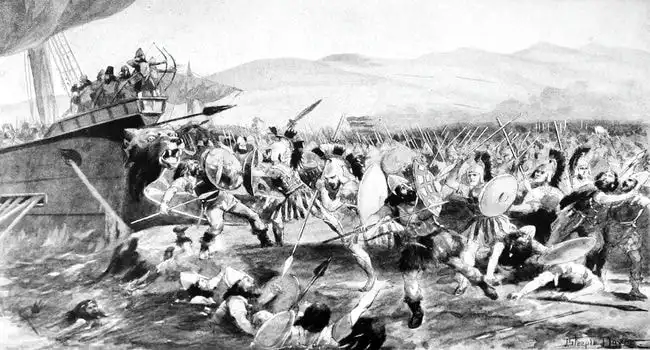
Photo Credit: Wikipedia
In 490 BC, the Persian Empire, seeking to expand its territories and influence, landed on the shores near Marathon to challenge the independent Greek city-states. Athens, understanding the geopolitical implications of a Persian victory, mobilized a force to defend its freedom and autonomy. Despite facing significant numerical odds, the Athenians, under General Miltiades, utilized their superior understanding of the terrain and their innovative phalanx formation to stage a robust defense. Persia, under King Darius I, aimed to subjugate Athens and integrate it into the expanding Persian domain, punishing it for its role in the Ionian Revolts.
As the Persian forces, a mix of light infantry, archers, and elite Immortals, began their assault, the Greek hoplites waited for the opportune moment to strike. Observing a tactical error in the Persian formation, the Greeks initiated a bold frontal assault. The momentum of this sudden attack disrupted the Persian lines, leading to a swift and decisive Greek victory. This battle did more than repel a single invasion; it marked a vital defense of the nascent Greek democratic ideals against foreign despotism. Furthermore, Marathon became an enduring symbol of courage against overwhelming odds, and it played a foundational role in the collective Greek identity. The ripple effects of this victory, both immediate and long-term, cannot be understated; Marathon shifted the balance of power and set the stage for future Greco-Persian conflicts, shaping the course of Western civilization.
9- Battle of Tours (732 AD)
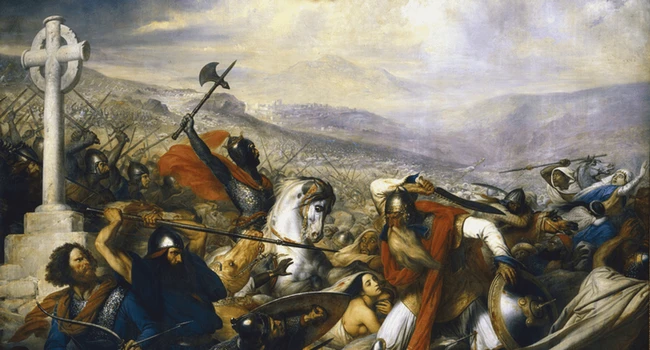
Photo Credit: World History Encyclopedia
In the early 8th century, the rapid expansion of the Umayyad Caliphate brought its forces into the heart of Western Europe, threatening the Christian dominions. Charles Martel, a Frankish statesman and military leader, recognizing the existential nature of the Islamic incursion, assembled his forces near Tours. The Umayyad forces, having experienced success after success in their campaigns, were confident and sought to extend their domain beyond the Pyrenees. In a tactical masterstroke, Martel utilized a compact infantry formation to withstand repeated Umayyad cavalry charges. The tenacity and discipline of the Frankish troops, combined with the strategic high ground they occupied, thwarted the Umayyad onslaught.
As the battle raged, the tide began to turn in favor of the Franks. The Umayyad forces, unaccustomed to such stiff resistance, began to waver. Sensing an opportunity, Martel ordered a counter-attack that ultimately routed the invaders. The significance of the Battle of Tours extends beyond the immediate military victory. It acted as a bulwark against further Islamic expansion into Europe, preserving the Christian identity of the continent. Moreover, Martel’s leadership laid the groundwork for the Carolingian Empire, which would shape European politics and culture for centuries.
8- Battle of Hastings (1066 AD)
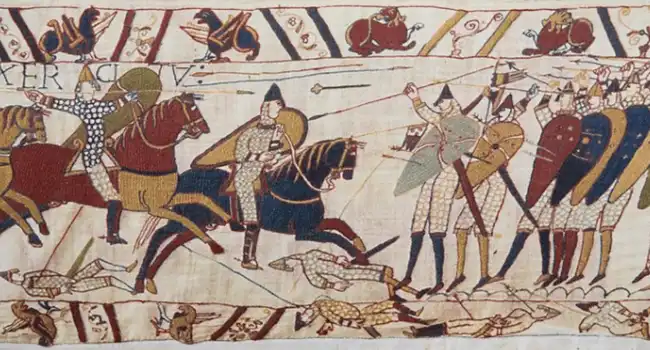
Photo Credit: BBC
In the turbulent aftermath of King Edward the Confessor’s death, England’s throne was hotly contested. William, Duke of Normandy, asserted his claim by launching an audacious invasion across the English Channel. Meeting him at Hastings was Harold Godwinson, the newly crowned but contested King of England. The English, adopting a defensive strategy, formed a formidable shield wall atop Senlac Hill, forcing the Normans to undertake uphill assaults. Utilizing a combination of archers, infantry, and cavalry, William sought to break the English lines, but the wall held firm.
As hours passed, a momentary feint of retreat by the Normans caused a section of the English forces to break ranks. Seizing upon this, the Normans turned and inflicted heavy casualties, creating a chink in the English defenses. In the fierce combat that ensued, King Harold was killed, legend says by an arrow to the eye, leading to the eventual collapse of English resistance. The victory at Hastings had profound implications. William the Conqueror’s reign introduced Norman culture, governance, and feudal structures to England, fundamentally altering the island nation’s trajectory. The synthesis of Norman and Anglo-Saxon cultures gave rise to a new English identity, shaping the political and cultural landscape of the British Isles and, by extension, the world.
7- Battle of Saratoga (1777)
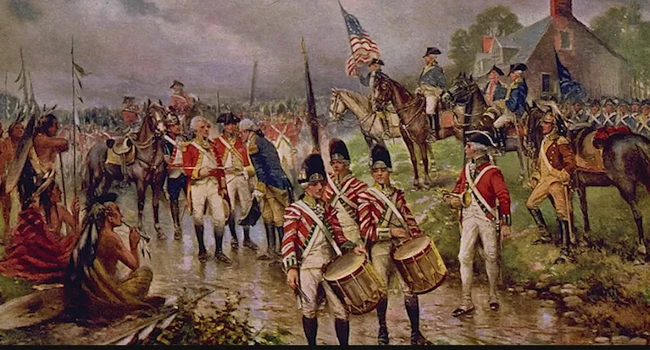
In the midst of the American Revolutionary War, British General John Burgoyne devised a plan to isolate New England, seen as the rebellion’s heartland, by advancing down from Canada to the Hudson River. This northern campaign, however, encountered significant resistance, culminating in a series of engagements near Saratoga, New York. The American forces, bolstered by superior intelligence and the terrain’s judicious use, impeded and harried the British at every turn. General Horatio Gates, leading the American forces, skillfully orchestrated a defense that capitalized on natural defenses and fortifications.
Burgoyne, anticipating support from New York City, found himself isolated as reinforcements under General Howe were redirected. As battles raged, it became clear that the British were ensnared in an unfavorable situation. The turning point occurred when Benedict Arnold, then still a loyal American general, led a spirited charge that shattered a key British position. With dwindling supplies and moral, Burgoyne finally capitulated, surrendering his entire force. The victory at Saratoga had implications far beyond the immediate military outcome. Crucially, it convinced France to enter the war as an American ally, tipping the strategic balance. The American quest for independence was no longer an insurrection; it was a global conflict that challenged the very foundation of empires.
6- Battle of Stalingrad (1942-1943)
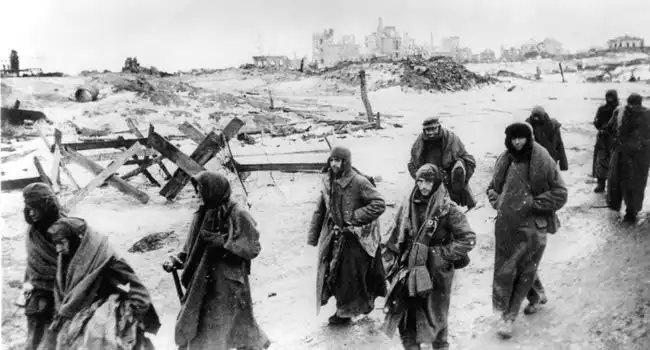
Photo Credit: France 24
The Eastern Front of World War II witnessed some of the largest battles in history, but none more pivotal than the struggle for Stalingrad. Hitler, seeking to secure his southern flank and control the oil fields of the Caucasus, directed the Wehrmacht to seize the city bearing Stalin’s name. What ensued was a brutal, building-to-building, room-to-room contest of attrition. The Soviets, recognizing the symbolic and strategic importance of the city, poured in resources and troops, vowing to defend it at all costs. The ferocity of the combat and the unforgiving Russian winter took a heavy toll on the German Sixth Army.
Hitler’s reluctance to allow a tactical withdrawal, combined with a massive Soviet encirclement operation, trapped the German forces within the city. As supplies dwindled and German soldiers faced starvation and freezing conditions, it became clear that the siege was unsustainable. The subsequent surrender of the German Sixth Army marked not only the battle’s end but also a turning point in the war. The invincibility of the Nazi war machine was shattered, and the Soviet Union began its inexorable push westward, signaling the Third Reich’s beginning of the end.
5- Battle of Waterloo (1815)
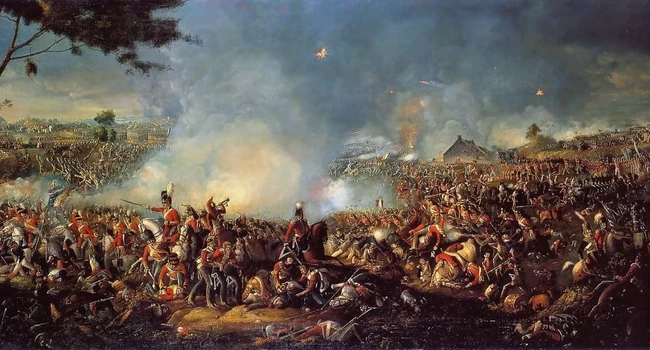
The Napoleonic Wars, which raged across Europe, reached their dramatic conclusion at a small Belgian village named Waterloo. Napoleon Bonaparte, having escaped exile from Elba, returned to France and quickly marshaled an army. Facing him was a coalition of allies, with the British army led by the Duke of Wellington and the Prussians under Gebhard Leberecht von Blücher. The battle, fought on June 18, 1815, was marked by intense combat, tactical feints, and the ebb and flow of momentum.
Napoleon sought to keep the two allied armies separated, but consistent communication and timely troop movements allowed the allies to present a united front. Despite several tactical advantages and the near breaking of British squares, French momentum was halted with the timely arrival of Prussian reinforcements. Pushed on all fronts and facing mounting casualties, the French army collapsed in disarray. Waterloo marked the definitive end of Napoleon’s military ambitions and his rule as Emperor of the French. The subsequent Congress of Vienna sought to create a balance of power in Europe, leading to a relative peace that lasted nearly a century.
4- Battle of Actium (31 BC)

The final war of the Roman Republic was characterized by political intrigue, shifting alliances, and the culmination of decades of civil unrest. The naval Battle of Actium, fought off the western coast of Greece, pitted the combined might of Cleopatra’s Egypt and Mark Antony against the forces of Octavian, the future Emperor Augustus. The engagement was as much a personal conflict, fueled by love, betrayal, and ambition, as a military one. Antony, influenced by his romantic and political alliance with Cleopatra, risked everything in this decisive battle.
However, Octavian’s general, Agrippa, executed superior naval tactics, using nimble Liburnian ships to outmaneuver and decimate the heavier Egyptian and Antonian galleys. Sensing imminent defeat, Cleopatra and Antony broke through the encirclement and fled, sealing the fate of their forces. Actium’s aftermath saw the consolidation of power in the hands of Octavian, who, as Augustus, transformed the Roman Republic into the Roman Empire. This battle’s impact was monumental, laying the foundation for the Pax Romana and shaping the Roman world’s political and cultural landscape for centuries.
3- Battle of Plataea (479 BC)

Following their defeat at Marathon, the Persians, under King Xerxes I, launched an even more formidable invasion of Greece. This expansive force sought to conquer and incorporate the fractious Greek city-states into the Persian Empire once and for all. The Battle of Plataea, one of the largest land battles of the Greco-Persian Wars, became the culmination of this epic confrontation. An alliance of Greek city-states, led predominantly by Sparta and Athens, assembled to face the Persian juggernaut. The Greeks, employing the hoplite phalanx—a dense formation of heavily armored infantry—capitalized on their cohesion and superior tactics.
The Persians, with their vast multi-ethnic army, including their elite Immortals, initially held the advantage in terms of numbers and positions. But strategic movements, feints, and a refusal to be drawn into unfavorable engagements by the Greeks turned the tide. A decisive push by the Greek center fragmented the Persian line. The resulting rout saw the bulk of Xerxes’ ground forces decimated. Plataea, along with the naval Battle of Salamis, effectively halted Persian expansion into Europe. These victories safeguarded the unique cultural, philosophical, and political developments of the Greek world, ensuring their enduring influence on Western civilization.
2- Battle of Sekigahara (1600)

In the turbulent landscape of feudal Japan, the Battle of Sekigahara stands as a monumental turning point. Following the sudden death of Toyotomi Hideyoshi, who had begun the process of unifying Japan, the nation was thrust into uncertainty. Two primary factions emerged, vying for dominance: the Western Army, loyal to Hideyoshi’s son, and the Eastern Army, under Tokugawa Ieyasu. The battlefield, shrouded in mist, set the stage for a clash that would determine Japan’s future direction.
Ieyasu, a master strategist, recognized the importance of key alliances and sought to exploit fissures within the Western Army’s ranks. As samurai clashed and arquebuses roared, the shifting loyalties of several daimyo turned the tide in favor of the Eastern Army. With a decisive charge, Ieyasu’s forces shattered the opposition, ensuring his ascendancy. The victory at Sekigahara laid the foundation for the Tokugawa Shogunate, which would rule a unified, peaceful, and isolated Japan for over 250 years. The cultural, political, and social frameworks established during this period had lasting implications, influencing Japan’s trajectory well into the modern era.
1- Battle of Trafalgar (1805)
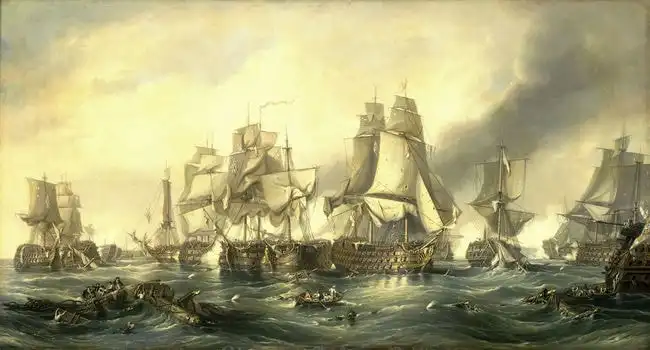
Photo Credit: Royal Museums Greenwich
The Napoleonic era’s maritime conflicts reached their zenith at the Battle of Trafalgar, off the southwest coast of Spain. Napoleon Bonaparte’s ambitions to dominate Europe extended to the high seas, and the combined French and Spanish fleet posed a significant threat to British interests. Under the command of Vice Admiral Horatio Nelson, the British Royal Navy sought to engage and decisively defeat this Franco-Spanish force. Nelson, discarding traditional line-of-battle tactics, employed an audacious plan. He split his fleet into two columns, driving them perpendicularly into the enemy’s line.
This innovative tactic, combined with superior British naval gunnery and ship maneuverability, inflicted chaos and devastating damage on the enemy fleet. Despite facing superior numbers, the Royal Navy achieved a resounding victory, destroying or capturing 22 enemy ships without losing a single one of their own. Tragically for the British, Nelson, a national hero, was mortally wounded during the battle. Trafalgar, however, ensured British naval dominance for the next century. It thwarted Napoleon’s plans for an invasion of Britain and solidified the Royal Navy’s reputation as the world’s preeminent maritime force, shaping the contours of global geopolitics during the age of empires.
These battles, while distinct in geography, participants, and immediate outcomes, collectively underscore the unpredictability of warfare and the far-reaching ramifications of military conflicts in shaping human history.


